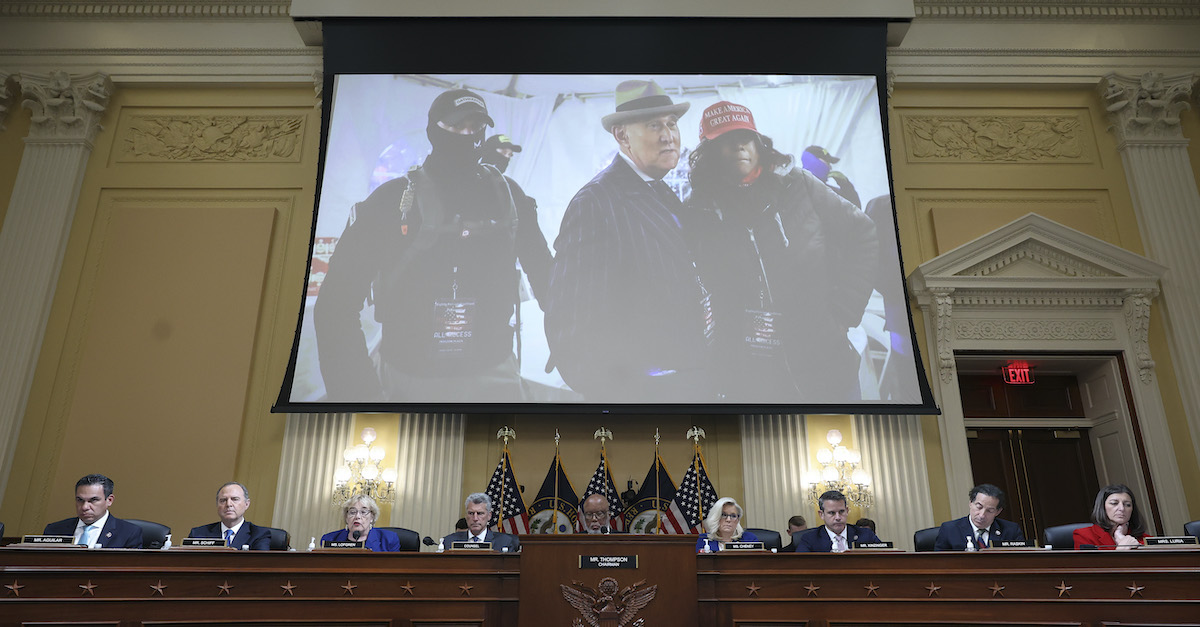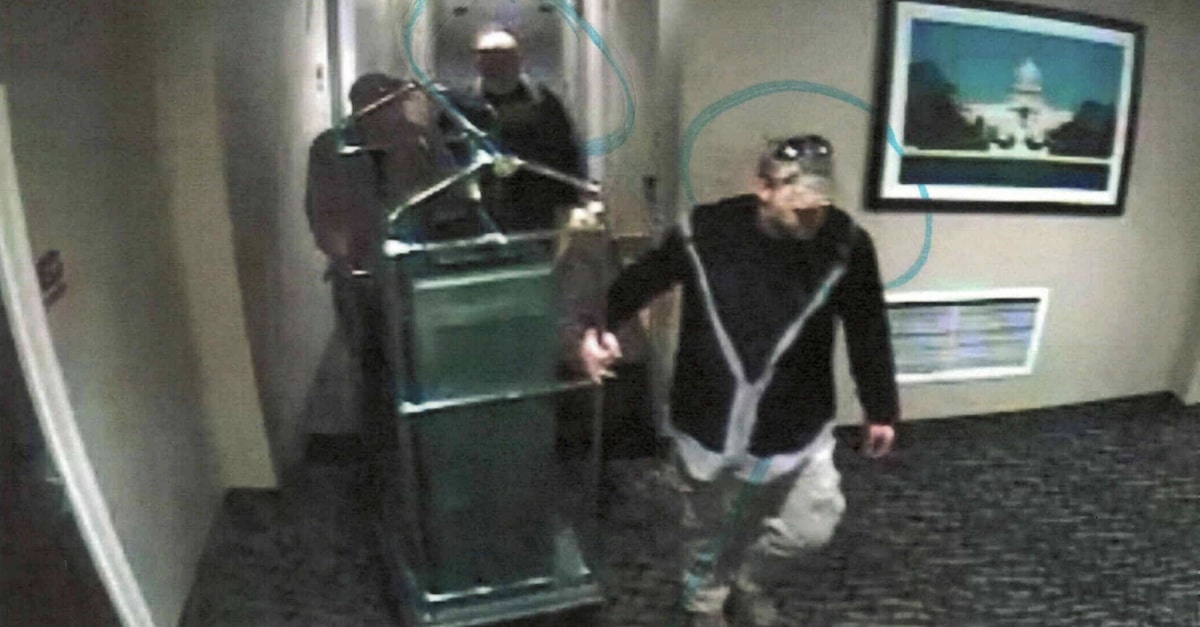
A photo of Roger Stone, a long time conservative political operative and consultant, being protected by members of the Oath Keepers, is shown during a hearing by the January 6th Committee on Oct. 13, 2022 in Washington, DC. (Photo by Alex Wong/Getty Images)
Stung by their clients’ reappearance in the Jan. 6th Committee’s dramatic return, attorneys for the Oath Keepers on Friday had a federal judge poll jurors on whether they watched the proceedings, which capped off with an historic subpoena of former President Donald Trump.
The request was made by an attorney for the right-wing group’s Florida chapter leader Kelly Meggs.
Attorney Stanley Woodward wanted reassurance from the jurors that they had not watched or read any news regarding Thursday’s meeting of the House committee investigating the Jan. 6. attack. During those proceedings, an image displayed showed an Oath Keepers member guarding Trump’s associate Roger Stone. The committee also disclosed new insights about the federal government’s early awareness of the Oath Keepers’ alleged antics.
One message from the Secret Service dated the day before the attack and presented by the committee read: “Right wing groups responding across the nation and establishing ‘quick reaction forces’ in Virginia,” an apparent allusion to the so-called “QRF” the Oath Keepers converged at a Comfort Inn in Ballston.
Woodward said that the hearing, which was broadcast on multiple news channels, included references to Oath Keepers members, including some of the defendants in this case. He told Mehta that he expected the jurors to say that they stayed away from coverage of the hearing, but he also sounded skeptical as to whether that would actually be the truth.
U.S. District Judge Amit Mehta indulged Woodward and polled the jurors one by one as to whether they had seen any video or media reports of the hearing. While the jurors’ responses were inaudible to reporters, the brevity of each response appeared to suggest that each had swiftly offered a “no” answer.
“Satisfied, counsel?” Mehta asked once questioning was finished before moving on.
On Friday, Mehta grew impatient with the attorneys, telling them that they need to do a better job of working out evidentiary disputes before the jury starts hearing testimony on trial days. He is presiding over the trial of Oath Keepers founder Stewart Rhodes and high-ranking members Kelly Meggs, Thomas Caldwell, Jessica Watkins, and Kenneth Harrelson.

Oath Keepers members Thomas Caldwell (center background) and Kenneth Harrelson (right foreground) move a cart of what prosecutors allege to be weapons inside a Comfort Inn in Virginia, for their so-called “Quick Reaction Force.” Prosecutors allege that they planned to ferry those firearms across the Potomac if then-President Trump called them. (Photo via DOJ)
Caldwell is accused of playing a key role in organizing the “Quick Reaction Force,” a crew of five Oath Keepers accused of stashing cache of weapons stored at a Virginia hotel, ready to be ferried across the Potomac River to the Capitol. Caldwell’s attorney was hoping to stop prosecutors from introducing certain text messages and Facebook posts that prosecutors wanted the jury to see, including a Facebook comment in which Caldwell said: “Tell me who to shoot first and I’m all in.”
After hearing the defense lawyer’s arguments, Mehta expressed frustration about the situation.
“I appreciate what you all are up against, and I wish I could roll back the clock and tell your clients not to put down what they’ve put down,” Mehta, himself a former public defender, told the attorneys. However, he said, “they’ve done what they’ve done. They can’t unring that bell.”
Mehta said that the text messages and social media posts from defendants are “clearly relevant to their state of mind.”
“Whether they meant it rhetorically, bombastically, what have you, that’s a question for the jury, not a basis to keep it out,” the judge said.
“This is why we have pretrial conferences,” he also said, adding that it is “particularly challenging” to keep the jury out of the room for so long.
“We need to have them in a good mood, and if they think we’re wasting their time they’re not going to be happy about it,” Mehta said.
After testimony finished on Friday and Mehta dismissed the jurors for the weekend, the judge navigated yet another evidentiary dispute: a recorded jailhouse call between Meggs and his son. Prosecutors want the jury to hear a clip of the call in which Meggs apparently refers to his guns being destroyed in a house fire. Meggs’ attorney, citing the federal evidentiary rule of completeness, wants to play a longer portion.
Mehta, who has heard the entire recording, noted that a jury would not be able to hear the entire call without being clued in to the fact that Meggs was detained when it was made — a fact that he doesn’t want the jury to hear. He also rejects Woodward’s completeness argument, saying that what’s discussed on the rest of the call outside of what the prosecutors want to play does not provide meaningful context.
Assistant U.S. Attorney Jeffrey Nestler said that he wants the jury to know that Meggs knew he was being recorded at the time. Mehta asked Nestler why that matters.
“Because he’s talking in code,” Nestler said. “To be clear, we don’t believe Mr. Meggs’ guns were lost in a fire, nor were they lost in a boating accident. He got rid of them so the government wouldn’t prosecute him.”
Nestler’s position here aligns with testimony that was offered Thursday by a now-retired FBI agent who participated in the search of Meggs’ house. During that testimony, the jury saw various pieces of documentary evidence indicating that Meggs owned multiple firearms, including emails between Meggs and an instructor of a weapons training course. When the home was searched, however, no guns were found, according to the agent.
Nestler added that the exchange between Meggs and his son is “part and parcel” with other messages from Meggs regarding “hiding all the tools.”
Nestler has previously said the Oath Keepers defendants often used the word “tools” as code for “guns.”